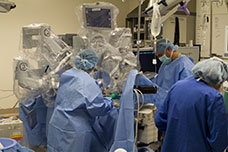
|
|
Welcome to the Division of Cardiothoracic Surgery
The Division of Cardiothoracic Surgery is an essential component of the comprehensive cardiovascular program at UC Irvine's School of Medicine, providing invaluable support to both the cardiology and trauma programs.
The division was reorganized and refocused in 1995, and it has since been a leader in terms of outcomes research and quality improvement. Our guiding principles are to:
- Provide the highest quality cardiothoracic surgery services and outcomes
- Offer superb customer service
- Emphasize continuous quality improvement
- Encourage growth and diversity of services
- Provide responsible, cost-effective care
- Prepare for the changing healthcare environment
For more than a decade, division faculty members have consistently achieved superior clinical outcomes in a challenging environment with critically ill patients. The most recent Leapfrog Report listed UC Irvine as one of only 98 hospitals as a “Leapfrog Top Hospital,” noting that our program is “better than the national average for coronary bypass procedures,” despite having one of the highest-risk populations in California.
This achievement can only be attributed to the dedication and hard work of all the team members. The sense of pride and accomplishment in what we do is shared by the entire team, including anesthesiologists, operating room personnel, intensive care unit staff, surgical residents and medical students.
At a time when applications for fellowship training in cardiothoracic surgery have diminished, we have placed several graduating residents in prestigious programs. This is a testament to the intensive educational experience received by the general surgery residents who rotate through our service. Our best and brightest remain challenged to master the complex hemodynamic and physiologic alterations found in our sickest patients. This is also a fertile educational environment for third- and fourth-year medical students who receive individual attention during their rotations, which include one-on-one discussions with attending physicians, and participation in the operating room team and on the clinical units.
One of our proudest achievements is the creation of a multidisciplinary program that thrives on teamwork and individual responsibility. This approach has dramatically increased the enthusiasm among team members across all areas of service. Today, there is a waiting list for nurses in the surgery ICU to train for the cardiac team, and we have more members wishing to participate on the operating room cardiac team than we can accommodate.
